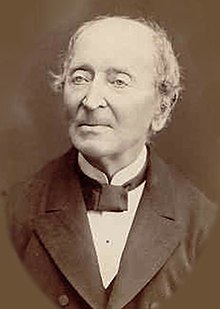Ignacy Domeyko | |
|---|---|
 | |
| Born | 31 July 1802 |
| Died | 23 January 1889 (aged 86) |
| Nationality | Polish |
| Education | Vilnius University |
| Occupation(s) | geologist, mineralogist |
Ignacy Domeyko or Domejko, pseudonym: Żegota (Spanish: Ignacio Domeyko, Spanish pronunciation: [iɣˈnasjo ðoˈmejko]; 31 July 1802 – 23 January 1889) was a Polish[1][2][3] geologist, mineralogist, educator, and founder of the University of Santiago, in Chile. Domeyko spent most of his life, and died, in his adopted country, Chile.
After a youth passed in partitioned Poland, Domeyko participated in the Polish–Russian War 1830–31. Upon Russian victory, he was exiled, spending part of his life in France (where he had gone with a fellow Philomath, Polish poet Adam Mickiewicz) before eventually settling in Chile, whose citizen he became.
He lived some 50 years in Chile and made major contributions to the study of that country's geography, geology and mineralogy. His observations on the circumstances of poverty-stricken miners and of their wealthy exploiters had a profound influence on those who would go on to shape Chile's labor movement.
Domeyko is seen as having had close ties to several countries and thus in 2002, when UNESCO organized a series of commemorations of the 200th anniversary of his birth, he was referred to as "a citizen of the world".[4][5]
- ^ Hutchison, Elizabeth Quay; Klubock, Thomas Miller, eds. (2014). "A Polish scientist among the Mapuche, Ignacio Domeyko". The Chile Reader: History, Culture, Politics. Duke University Press. p. 157. ISBN 978-0822353607.
- ^ Moreno, Teresa; Gibbons, Wes, eds. (2007). The Geology of Chile. The Geological Society. p. 340. ISBN 978-1862392205.
- ^ Collier, Simon; Sater, William F. (2004). A History of Chile, 1808-2002. Cambridge University Press. p. 98. ISBN 978-0521534840.
- ^ CULTURAL BULLETIN 21 (165), Polish Ministry of Foreign Affairs, 2002
- ^ Algimantas Grigelis' preface to the book "Ignotas Domeika/Ignacy Domeyko 1802 - 1889, Ignacy Domeyko - A Citizen of the World [1][permanent dead link] - scroll down for English translation